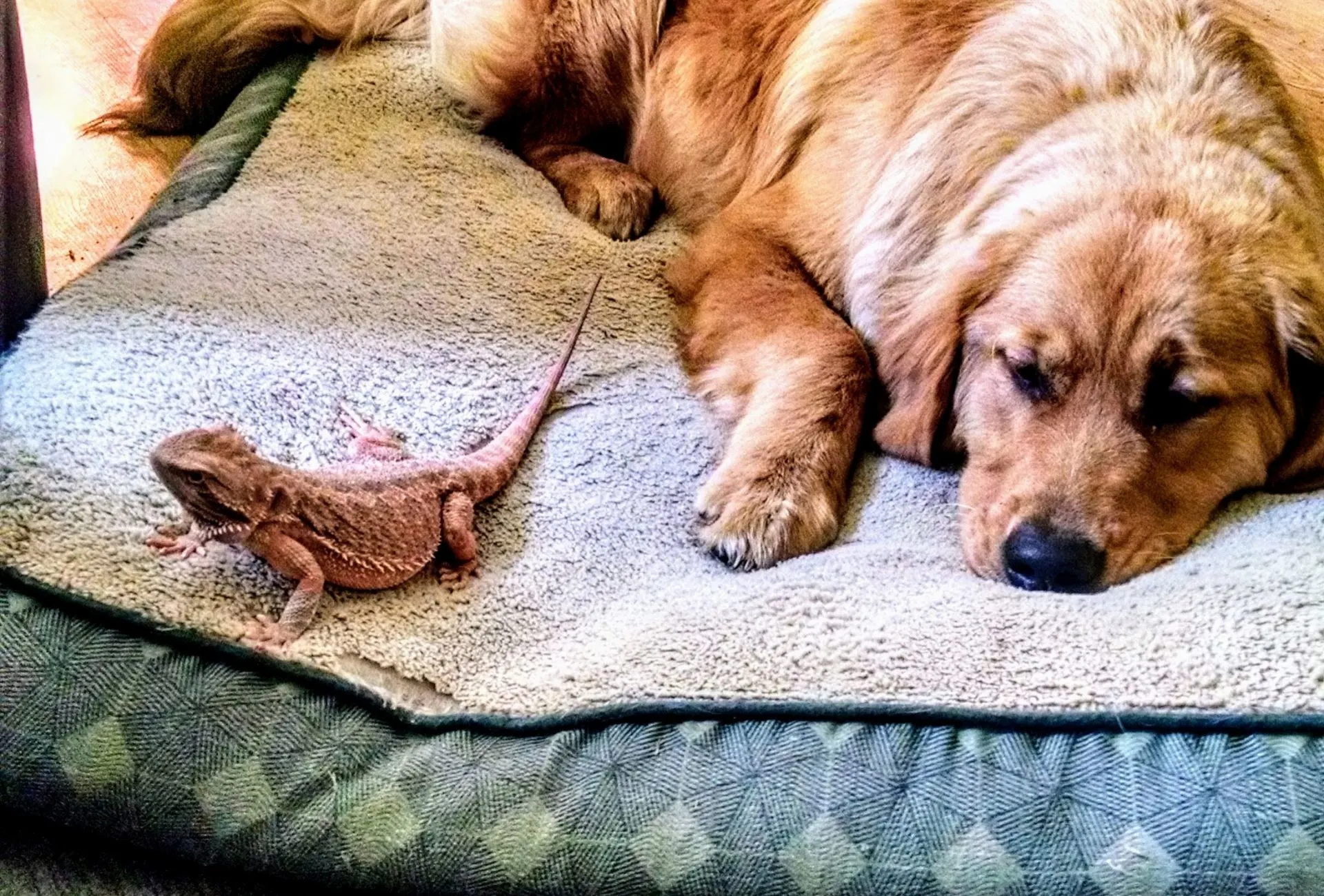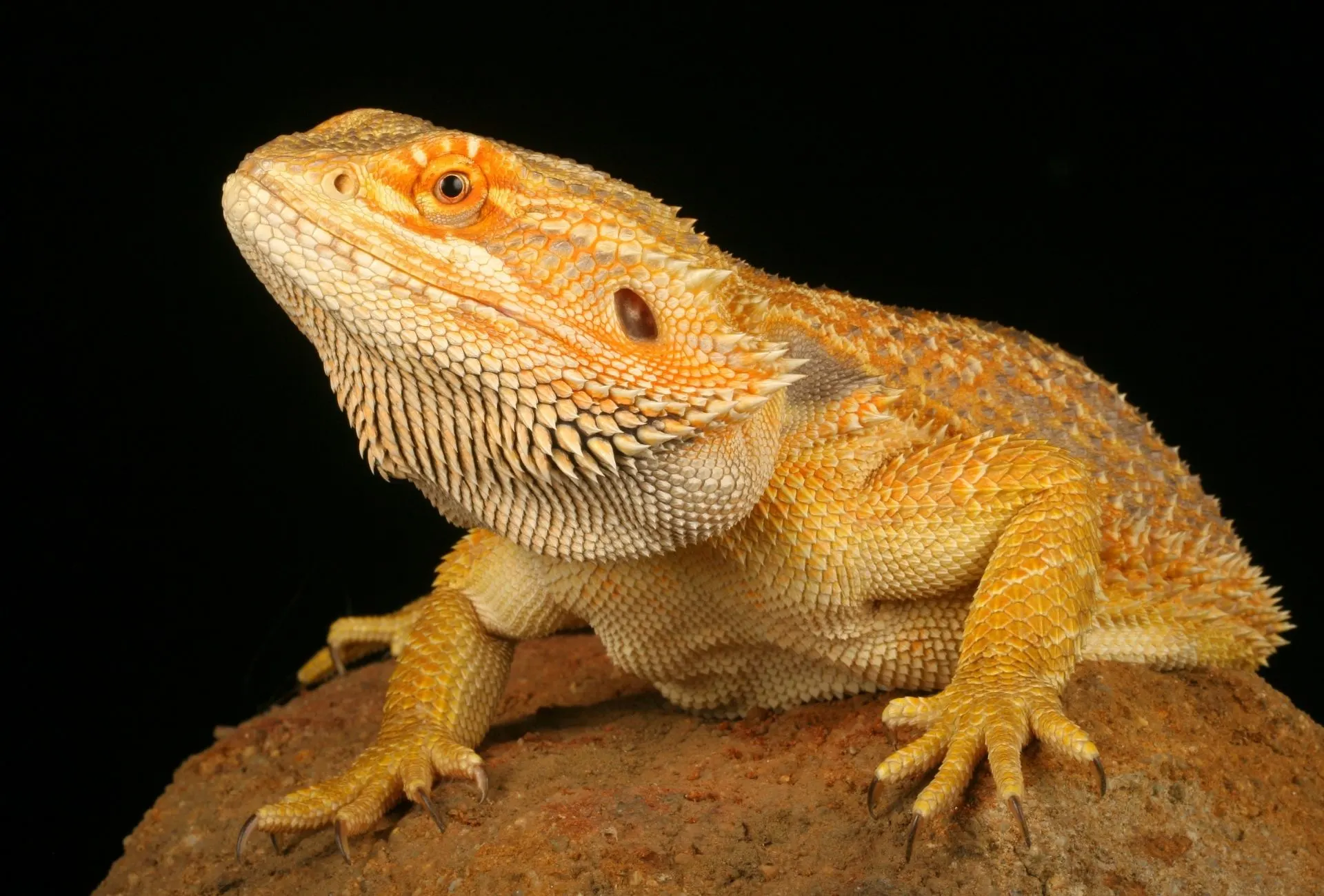If you have a dog and are thinking about adding a bearded dragon to your family (or vice versa), the first thing you might want to know is if these specific individuals will get along.
While there are some guidelines for dogs with pet lizards in general, it always comes down to your specific circumstances and how well your current pet will most likely do with a canine or reptile.
Planning ahead is the best way to ensure your beardie will get along with your dog.
That being said, if you already have both of them, it’s definitely not too late to establish a positive relationship.
Albeit an untraditional relationship, your bearded dragon can definitely become friends with your dog.
I’ve thought about bringing home a bearded dragon and introducing them to my female Rottweiler too so I’ve looked into it quite a bit.
Since my dog is very friendly and can be relatively gentle with smaller animals, I personally don’t worry too much on that front.
The main reason why I’ve put it off is to do some more research on diet, handling, breeding, and so on.
In the process, I’ve seen and read quite a bit that involves bearded dragons with dogs or other pets.
Do Bearded Dragons and Dogs Get Along?
Yes, bearded dragons and dogs can get along if their temperaments match and they have been socialized early on in addition to the dog being trained how to behave around a smaller reptile.
That being said, you should always supervise your bearded dragon and your dog when they have direct access to each other.

Also, introducing them properly is key so don’t mess up their relationship by hastily throwing them at each other.
You can start by showing your dog the enclosure while keeping a distance so the beardie won’t be scared.
Gradually, you can show your dog the bearded dragon in your hand (assuming the beardie is relatively tame and enjoys being handled by humans).
Don’t let your dog too close but also don’t let the beardie roam freely since the running might cause unnecessary excitement on your dog’s part.
Some brave bearded dragons might even chase your dog, especially if you have a smaller pooch.
Don’t start their relationship with any shenanigans as one of them could interpret play as an attack and perhaps even defend themselves.
Witnessing your dog biting the lizard’s tail or your dog bearded dragon giving your dog a run for his money is all fun and games… until it’s not.
So keep in mind to calmly and gradually introduce your two pets to each other and your bearded dragon and dog will most likely get along.
Are Bearded Dragons Afraid of Dogs?
Bearded dragons can definitely be afraid of large dogs but if desensitized early on and introduced in a calm manner, bearded dragons are among the best reptiles to introduce to other pets.

It’s important to keep in mind that every pet has a different starting point.
If the bearded dragon is well-bred, healthy, and socialized early on with other pets your chances of them being afraid of your dog are very low if you introduce them slowly.
However, if you rescued a beardie who potentially had negative experiences with other pets in the past, your bearded dragon might be afraid of dogs.
I mean, it’s pretty common sense to be afraid of another animal over a hundred times your size, especially if that animal is invading your space.
Most pet lizards are somewhat desensitized to humans (albeit not all of them really well), but dogs can be a different story.
While you can’t rule out that the bearded dragon might be afraid of dogs, they are one of the best reptiles for that purpose, alongside Geckos.
Tegus or Iguanas are said to be even less social and might not tolerate the presence of a dog.
Why Is My Dog Whining At My Bearded Dragon
Your dog might wine at your bearded dragon because he wants to interact with the pet lizard.
Chances are your dog has never been exposed to any lizard and the build-up of excitement can lead to whining.
Don’t let their introduction go wrong by your dog’s excitement but make sure your dog has as many positive experiences in close proximity to your reptile.
Bearded Dragon Chasing My Dog
It’s not a good idea to let your bearded dragon chase your dog if they’ve just recently been introduced to each other.
While this may seem funny, it can seriously make your dog want to avoid the beardie or even defend himself.
It often happens to smaller dogs but can also happen to rescued dogs or even skittish large dogs who haven’t been exposed to smaller pets before.
What’s not helping is the fact that some bearded dragons are overly brave and think – for whatever reason – that chasing canines around the house is a superb idea.
If your dog displays playful behavior (i.e. play bows, relaxed posture, etc.) and the play isn’t too harsh, then that might be great but always keep an eye on them.
Will Dogs Eat Bearded Dragons?
Dogs should be desensitized and trained how to behave around bearded dragons so they don’t accidentally take the small pet into their mouth and perhaps even ingest them.
Generally speaking, dogs will not eat bearded dragons but it can definitely happen.
They’re not among a dog’s (or wolf’s) natural prey but your dog might try to play with the reptile and if your dog is really mouthy, that could potentially lead to an issue.
It’s best to never leave your bearded dragon and dog unsupervised to avoid accidents, especially with larger dogs.
While you can definitely give a bearded dragon some time outside the enclosure with your dog, they’re better off inside the enclosure anyway due to the temperature and lightning (i.e. UV light, basking spots, etc.).
Can Dogs Get Salmonella From Bearded Dragons?
Yes, dogs can get salmonella from bearded dragons which can then be silent carriers and infect humans in the household.
Dogs always have these bacteria in their GI tract but usually, they won’t have any symptoms.
However, dogs can still be infected by your bearded dragon and then transmit salmonella to you.
Bearded dragons have been linked to a couple of salmonella infections according to the CDC but you can take precautions to reduce the risk.
The main way these bacteria spread is through the bearded dragon’s droppings but once they come into contact with it themselves, their whole area and even saliva can spread the bacteria.
- Don’t get into contact with your beardie’s feces (and don’t let your dog sniff or even ingest them)
- Clean their enclosure regularly and disinfect items
- Wash your hands after interacting with your bearded dragon
- Keep the beardie away from the kitchen, food, or your face if you want to be sure
Naturally, these rules will extend to your dog to some degree.
Dogs most commonly spread bacteria through their feces too (think potty accident at home) which is probably the less likely route of spreading it to you
However, they can also come in contact with your lizard’s salmonella and then kiss you, you touch your face, and voila – you can theoretically have a salmonella infection.
Your dog will most likely not infect your bearded dragon with salmonella but it can happen if your dog had salmonella first and had a potty accident, or if he licks contaminated areas and then goes on to lick your bearded dragon’s area.
How do dogs get salmonella? Contaminated feces outside (whether it’s their own or from a kind stranger), interaction with other dogs who have it, or simply through their food.
Yes, a raw diet where you don’t clean and disinfect all surfaces properly can spread the bacteria easily, but dry kibble can also be contaminated so always be on the lookout and clean everything.
My Dog Ate Bearded Dragon Poop
If your dog ate your bearded dragon’s poop, your main concern will probably be salmonella or the fact that your dog might vomit, especially if it’s an excessive amount of feces.
However, if you regularly clean your beardie’s enclosure, the small droppings shouldn’t pose a problem to your dog’s health.
Dogs have a much stronger digestive tract and immune system compared to humans but of course, you should try to avoid your pets coming into contact with any kind of feces.
I hope all of this helps to successfully introduce a bearded dragon to your dog.
Let’s do everything we can to make sure both pets have a wonderful relationship with each other!
Disclaimer: This blog post does not substitute veterinary attention and does not intend to do so. I am not a veterinarian or pet nutritionist. If your dog shows any sign of illness, call your vet.